Famed anthropologist Margaret Mead once said, "Never doubt that a small group of thoughtful, committed people can change the world. Indeed, it is the only thing that ever has." Her inspirational words have been taken to heart by many animal rights activists who believe that they can have a very real impact on the way society treats animals. Individuals of all ages and from all walks of life are taking on multi-million-dollar industries that abuse and exploit animals and raising awareness about animal rights issues.
Mercy for Animals
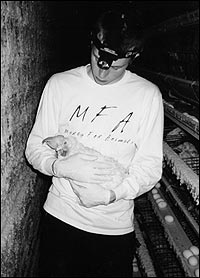 While other kids his age were playing video games and hanging out at the mall, 15-year-old
While other kids his age were playing video games and hanging out at the mall, 15-year-old
Nathan Runkle (right) was starting the Ohio-based group Mercy for Animals (MFA). Nathan, now 20, has investigated and exposed the horrific treatment of hens at three major egg farms near his home in the Columbus area: Buckeye Egg Farm, Daylay Egg Farm, and Weaver Bros. Egg Farm.
Before each investigation, Nathan sent a certified letter to the farms to request a tour. The requests were ignored, but that didn't stop him. He and other young members of MFA entered the farms at night and documented the conditions with video cameras.
One video, taken at Weaver Bros. Egg Farm in December 2002 by MFA member Derek Coons, shows Nathan cradling a hen he found still alive in a trash can full of dead birds. Nathan told The Toledo Blade, one of the many newspapers that reported on the investigation, that he "would have easily mistaken this hen, determined to survive, for a lifeless corpse had she not lifted her tiny head, stared at [him] with curiosity, and blinked her eyes from atop the pile." The hen, whom Nathan named Hope, was one of more than 30 birds rescued by MFA between September 2001 and December 2002.
Although Nathan has never been arrested for his actions, he has been threatened by various law enforcement officials. But Nathan is "more worried about the suffering of animals going unseen" and is willing to risk prosecution to educate others about the cruel and unsanitary conditions on factory farms. He believes that video footage is one of the most powerful ways to persuade people not to buy eggs and other animal products and he has received calls, letters, and e-mails from people all over the world who claim that MFA's investigations have opened their eyes and convinced them to go vegan.
Nathan and other MFA volunteers have even received permission from public libraries to create displays about veganism and other animal rights issues and they regularly donate books, videos, and DVDs on related topics to the libraries.
Nathan is optimistic that activists can make a difference. "There are so many things everyone can do," Nathan recently said in an interview for GRRR!, People for the Ethical Treatment of Animals' (PETA's) magazine for young people, "Get active with a local animal rights group. If there isn't one, start it! Table, leaflet, protest, write letters, show videos, talk to people; anything you can do to be a voice for the voiceless."
Animal Rights NOW!
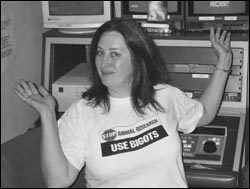 Cable access shows are an effective way to reach a large audience.
Cable access shows are an effective way to reach a large audience.
Phyllis Bedford (right), the volunteer producer of Animal Rights NOW!, a cable access show in Atlanta, Ga., regularly shows graphic footage from inside animal research laboratories and on factory farms, coverage of animal rights protests, interviews with individuals in the animal rights movement, and more.
Animal Rights NOW! is in its sixth consecutive season thanks to Phyllis' dedication and persistence. Since the station grants air time on a first come, first awarded basis, Phyllis camps out in front of the station's door before 6:30 a.m. on the first day the station accepts applications. Because the office doesn't even open until 10 a.m., she usually beats out the other producers and is assured air time for the next season.
"I'd really like to encourage other activists to check into getting a show on their cable access station," says Phyllis. "PETA is so generous with their video resources that it makes it easy to expose animal suffering that is normally hidden from the public. And if the public doesn't know the problem exists, change is not likely to happen."
Tasty and Meatless
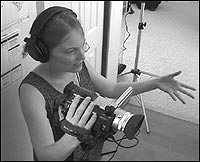 Joy Waters (right), the producer, director, business manager, sales representative, and general Jack-of-all-trades for Tasty and Meatless, a popular cable show on the Oceanic Time Warner Channel 16 in Hawaii, agrees that "TV is a powerful medium that can really impact behavioral change." Her show began airing in January 2003 and has a growing number of loyal viewers. Joy feels that "being on a commercial cable station gives the vegetarian movement more credibility."
Joy Waters (right), the producer, director, business manager, sales representative, and general Jack-of-all-trades for Tasty and Meatless, a popular cable show on the Oceanic Time Warner Channel 16 in Hawaii, agrees that "TV is a powerful medium that can really impact behavioral change." Her show began airing in January 2003 and has a growing number of loyal viewers. Joy feels that "being on a commercial cable station gives the vegetarian movement more credibility."
She started the series to help people in transition to a vegetarian diet. According to Joy, "most of our viewers are meat eaters whose doctors just told them their cholesterol is too high and they don't know what to do." The show features segments on vegetarian cooking, health tips, information on organizations that offer healthy products and services, and interviews with inspiring people who follow a meatless lifestyle.
According to TastyandMeatless.com, "in just 30 minutes, you can learn everything you need to know to make eating less meat easy, convenient, and most importantly, tasty!" Joy encourages other activists to visit the site and sign up for the monthly newsletter to learn how they can help get Tasty and Meatless broadcast in their state.
Teaching Healthy Eating Habits
Other activists are working to get meatless meals and other healthy vegan options served in schools. When
Jackie Domac, a former teacher and health department chairwomen at Venice High School in California, informed a school administrator that a few of her students had requested juice in addition to soda in the school vending machines, she was told that selling juice would conflict with the school's soda contract. Outraged that money from Coca-Cola sales was more important than giving students healthy beverage choices, Jackie, a vegan for nearly 20 years, and her students circulated petitions, met with parents, attended school board meetings, and more, in an effort to get healthier food and beverages in the school.
Not only did they convince school officials to replace the sodas in the school vending machine with bottled water, sports drinks, and juices, they also succeeded in getting the school to add a fruit and vegetable bar to the school cafeteria and serve vegetarian-chili potato boats twice a week–a vegan option that meets the National School Lunch Program's requirements. According to Jackie, Venice High School was also the first high school in the nation to get an organic soy milk vending machine.
But that wasn't enough for Jackie. She wanted all students in the Los Angeles Unified School District (LAUSD)–the second largest school district in the nation with 1,030 schools–to have access to healthy vegan food. Jackie rallied students, parents, teachers, and school board members to support the LAUSD Obesity Prevention Resolution, which encourages schools to provide kids with healthy snacks instead of candy bars, eliminate contracts with fast-food companies, offer students at least one vegetarian option at lunchtime, and pilot soy milk in five area schools. Thanks to Jackie's hard work, the resolution will take effect in July 2004.
PETA was so impressed with Jackie's efforts that they hired her as their new education manager. Part of her job duties will be to convince other schools around the nation to offer healthy, humane vegetarian options.
Saving Their "Bacon"
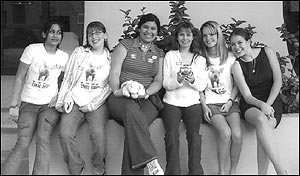 Shortly after Jackie started her new position at PETA, she received e-mails from
Shortly after Jackie started her new position at PETA, she received e-mails from
Leonor "Leo" Armas and Natasha Patterer, students (right) at Coral Reef Senior High School in Miami, Fla. who were upset that the school's Future Farmers of America Club (FFA) were raising a pig–callously named "Bacon"–to be auctioned off for slaughter in order to generate funds for the school.
Leo, Natasha, and many other students had grown attached to the pig and were determined to see her in a sanctuary instead of a slaughterhouse. With Jackie's guidance, the girls and their friends spoke with the school principal, wrote letters to the local media, and worked to raise funds to send her to a sanctuary.
Leo gave an impassioned speech before the Coral Reef School Board on March 17, 2004 and pleaded for the pig's life. Frank Cobo, a sympathetic board member, was so moved by Leo's words, he donated the $900 opening bid needed to buy "Bacon" and promised to help introduce a policy prohibiting the school from buying more animals for slaughter.
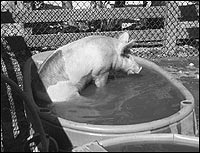 With the other money they raised, Leo, Natasha and their fellow students were able to buy three other animals who were slated to be auctioned at the Miami-Dade County Fair. On March 21, 2004, the day after the auction–and several weeks after the girls contacted Jackie–"Bacon," now named
With the other money they raised, Leo, Natasha and their fellow students were able to buy three other animals who were slated to be auctioned at the Miami-Dade County Fair. On March 21, 2004, the day after the auction–and several weeks after the girls contacted Jackie–"Bacon," now named
Daisy (left), and her friends Petunia, Tulip, and Mary, were taken to the Wildlife Care Center in Fort Lauderdale, Fla where they spent their days splashing in a pool and racing around. In May, Daisy and her friends were sent to their permanent home at Tennessee's Shepherd's Green, an accredited sanctuary.
Cutting Out Dissection
Countless other students across the U.S. are taking action to help animals.
Laurie Wolff of Clark County, Nev. even prompted the Clark County School District–the seventh largest in the country, with 277 schools –to enact a student choice policy letting students decide for themselves if they want to dissect animals or not.
Laurie, a straight "A" student, had refused to dissect an earthworm when she was in the 6th grade and was given a "C" for the assignment. Appalled by the injustice, she wrote letters to the principal, the superintendent, and the school board members, spoke with teachers and other students, and led a petition drive. Her hard work paid off two years later, in April of 2002, when the student choice policy was implemented.
Because of her ground-breaking achievement, Laurie was featured on CNN, CBS News, in The New York Times, and numerous other media outlets. After the new policy passed, she told the Las Vegas Sun that she wanted to change the rules before she was instructed to dissect again. "At a lot of high schools they cut up pigs, frogs, even cats," she said. "I figured the rules saying you have to dissect were probably even more strict there than in sixth grade, so I had better do something now."
Christianity, Violence, and Animals
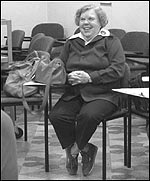 Xavier University students are learning respect and compassion for animals from theologian and professor
Xavier University students are learning respect and compassion for animals from theologian and professor
Dr. Elizabeth Farians (right). She designed and teaches Christianity, Violence, and Animals, a course about "the relationship between people and animals with violence as the focus." The class covers the connection between the violence we inflict on animals and the resulting violent behavior of humans.
Dr. Farians wants other teachers "to get the idea to get the animals into the college curriculum, especially in theology." According to her Web site, ape-connections.org, "Christians have been mostly uninformed or misinformed about how God intended them to treat animals...As decent people, religious or otherwise, we must rectify this situation and treat animals with respect and compassion. This must be the norm for everyone."
Helping Not Hurting
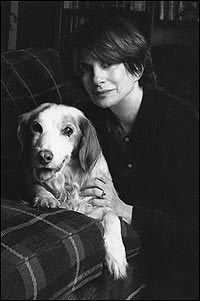
Elaine Sloan (right), a breast cancer survivor and dedicated animal rights activist, agrees that "more people should take steps to help animals. All of them. Mice and rats and cows and chickens and other animals feel pain just like dogs and cats do. It's incongruous to pet some animals and eat, wear, or experiment on others."
Elaine was not pleased when she found out that proceeds from the Avon 3-Day Breast Cancer Walk were being used to fund cruel, irrelevant experiments on animals. She contacted the charity–repeatedly–and threatened to give back the pledges she had collected if they were not designated for non-animal purposes.
"I don't want any animals tortured in my name," said Elaine. "There is already enough suffering in this world; we don't need to inflict any moreŠ Animals' lives are just as special to them as ours are to us."
On November 2, 2001, soon after she began contacting the charity to complain, she received a letter from Mary Quinn, the senior manager of Avon Products Foundation, Inc., informing her that "[a]s of this fall, the official policy of the Avon Products Foundation is that no new Avon Breast Cancer Crusade funds will be used to support breast cancer research products involving the use of animals."
Elaine was elated. "It took a bit of work, but apparently I made enough of a nuisance of myself to have an effect."
Putting the Reins on the Rodeo
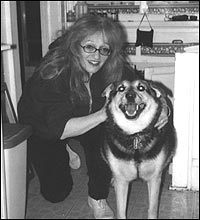 Another dedicated activist,
Another dedicated activist,
Kiley Blackman (right), the founder of Animal Defenders of Westchester (ADW), a grassroots group with approximately 50 people on its mailing list, persevered until she got the Bronx International Championship Rodeo canceled.
"It was canceled after its third time here," said Kiley, who contacted the event's sponsors and local politicians, wrote letters to the editor of area papers, and held high-profile demonstrations. "The politicians originally blew me off," remarked Kiley. "I persisted to a degree that I surprised even myself–because I am a pessimist, and they were clearly 'married' to this rodeo."
Her diligence paid off just when she was starting to lose hope. "I had asked John Dudley [the district manager] of Community Board Three [which governs the district the rodeo was in] for a formal meeting to show video, implements, etc., and we were in the process of arranging it. I had faxed in a request, as per his direction. After a few weeks, he called me at my job with the good news; I almost started crying with joy."
Kiley and other members of ADW are now using a similar strategy to convince NBC Channel 4 to stop broadcasting bull riding.
Making a Difference
The list of dedicated activists and their achievements goes on and on. Virtually every day, PETA receives calls, letters, or e-mails from people like Pamela Dragon, a young woman who convinced an import store in her local mall to stop selling turtles and pledge to never again sell animals; Cherie and Craig Cline, an Oregon couple who influenced the Humane Society of the Willamette Valley to implement a "no meat at events" policy; and Mary Max, a New Yorker who swayed several restaurants to stop serving veal, arranged local screenings of animal activist Eddie Lama's award-winning animal rights video, The Witness, and more.
Activists all around the globe are making a difference for animals and PETA is attempting to help others become more active. Helping Animals 101, a two-day conference conducted by PETA, is offered for those who want to become more involved in the animal rights movement. The conference is designed to help both novice and experienced activists improve conditions at their local animal shelters, fight for anti-chaining and spay/neuter legislation, start animal rights groups, create effective displays, make and distribute leaflets, write informative letters to the editor, and much more. Upcoming conferences are scheduled in Los Angeles, Denver, New York City, Kansas City, and other cities around the U.S.
PETA also provides a variety of resources, including a Guide to Becoming an Activist, for people who want to help animals but are not able to attend the seminars. Activists can also order leaflets, posters, stickers, videos, and other materials for use in demonstrations and other outreach events.
Good intentions are not always enough. It will take unwavering activism to achieve animal liberation. As political philosopher Edmund Burke once said, "The only thing necessary for the triumph of evil is for good men to do nothing."•
Heather Moore is a staff writer for People for the Ethical Treatment of Animals (PETA) and a regular contributor to IMPACT press.
Email your feedback on this article to editor@impactpress.com.
Make an IMPACT
Other articles by Heather Moore:



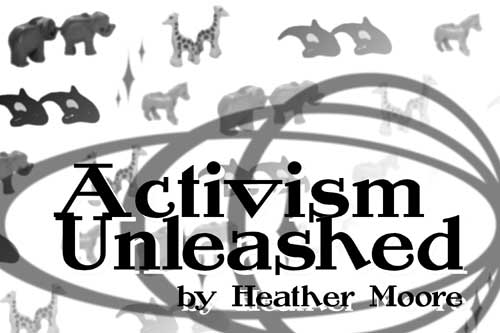
 While other kids his age were playing video games and hanging out at the mall, 15-year-old
While other kids his age were playing video games and hanging out at the mall, 15-year-old  Cable access shows are an effective way to reach a large audience.
Cable access shows are an effective way to reach a large audience.  Joy Waters (right), the producer, director, business manager, sales representative, and general Jack-of-all-trades for Tasty and Meatless, a popular cable show on the Oceanic Time Warner Channel 16 in Hawaii, agrees that "TV is a powerful medium that can really impact behavioral change." Her show began airing in January 2003 and has a growing number of loyal viewers. Joy feels that "being on a commercial cable station gives the vegetarian movement more credibility."
Joy Waters (right), the producer, director, business manager, sales representative, and general Jack-of-all-trades for Tasty and Meatless, a popular cable show on the Oceanic Time Warner Channel 16 in Hawaii, agrees that "TV is a powerful medium that can really impact behavioral change." Her show began airing in January 2003 and has a growing number of loyal viewers. Joy feels that "being on a commercial cable station gives the vegetarian movement more credibility."
 Shortly after Jackie started her new position at PETA, she received e-mails from
Shortly after Jackie started her new position at PETA, she received e-mails from  With the other money they raised, Leo, Natasha and their fellow students were able to buy three other animals who were slated to be auctioned at the Miami-Dade County Fair. On March 21, 2004, the day after the auction–and several weeks after the girls contacted Jackie–"Bacon," now named
With the other money they raised, Leo, Natasha and their fellow students were able to buy three other animals who were slated to be auctioned at the Miami-Dade County Fair. On March 21, 2004, the day after the auction–and several weeks after the girls contacted Jackie–"Bacon," now named  Xavier University students are learning respect and compassion for animals from theologian and professor
Xavier University students are learning respect and compassion for animals from theologian and professor 
 Another dedicated activist,
Another dedicated activist,